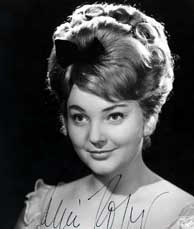Most Revered Teacher - Harold M. Barlow

(click for to learn about Harold)
Coloratura
Coloratura style, you can tell they've worked!
Amazing coloratura sopranos of all times!
These are silvery TRUE coloraturas---not heavy, dark mezzos or dramatic sopranos 'slumming' in coloratura country and trying to prove that they too can hit that high E flat—that's not all this repertoire is about—these are high wire roles.
00:04 Madd Robin (1918-1960 French) - Lucia di Lammermoor
01:00 Mady Mesple (1931- French) - Ariadne auf Naxos
03:14 Lily Pons (1898-1976 French American) - Lakme
03:56 Silvia Voinea (Romanian) - Lakme
05:22 Anna Moffo (1932-2006 American) - Il Barbiere di Siviglia
07:20 Beverly Sills (1929-2007 American) - Giulio Cesare
09:13 Luciana Serra (1946 Italian) - Die Zauberflote
10:12 Edda Moser (1938 German) - Die Zauberflote
11:03 Edita Gruberova (1946 Slovak) - Lucio Silla
12:50 Joan Sutherland (1926-2010 Australian) - La Traviata
14:30 June Anderson (1952 American) Semiramide
16:44 Mariella Devia (1948 Italian) Lucia di Lammermoor
18:00 Ruth Ann Swenson (1959 American) I Puritani
20:08 Natalie Dessay (1965 French) Candide
21:39 Elisabeth Vidal (1960 French) Mozart Concert Aria
22:59 Diana Damrau (1971 German) Le Comte Dry
27:12 Desiree Rancatore (1977 Italian) Les Huguenots
28:24 Jessica Pratt (1979 Australian) Adelaide di Borgogna
29:29 Maria Aleida Rodriguez (Cuban American) Linda di Chamounix
"Maria Callas sings three phenomenal Flute-like notes up to Eb6 in Leonard Bernstein's Ornaments"
In terms of pure musical thrill, this is my favorite Callas moment. The variation on the last verse with the staccati up to Eb and descent to Ab is magical, but what I love most is actually the part immediately after (at 2:43). Bernstein's tempo is breathtakingly fast, but Callas dispatches the series of turns with arrogant ease. She is the only person who does the 'con gran forza' on the last set of sixteenth notes. It's a pure diva move, but also exactly what Bellini has written into the score. Then, of course, she follows up with a laser-like Eb that bursts out of nowhere. It's one of my favorite moments because it isn't an interpolation or a cadenza, just a superhuman interpretation of Bellini's written notes, that no one else has come even close.
If a vocal ornament could reach diamond status, the ascending staccati to E-flat at 2:18 would be it. I cannot even begin to fathom the amount of voice physiology involved. A true butterfly.
They claim 1952 was the year of Callas, same for 1950 Mexico. For me? Anything after '54-''65 is her years. The voice of opera, the complete and outstanding female queen of Opera showed her true colors after losing the weight and it showed in her easy vocalisms. For example, she demonstrates messa di voce and allarrendo on staccato notes! No one has done that and maintained the flow of the melody, with a clear-cut example of legatissimo!
After the crystal-clear staccato ascending passage she deliciously descends down to lower contralto chest-notes, makes it sound as easy as breathing. I have to admit this descending variation to the low Aflat is so thrilling and equally beautiful to the perfectly executed ascending staccati cascade. Sutherland also uses this lower variation in the first recording of Sonnambula where she is vocally on fire but I doubt she ever sang it live. It sounds like the badge of honor of a true Assoluta.
"Lucia Popp sings Queen of the Night" aria from "The Magic Flute" by Mozart
The picture during the video is of Maria Callas (who never sang this role), but the voice is Lucia Popp

Popp is one of the most under rated singers of the 20th century, simply marvelous.
Even performing this dark and plaintive aria her voice is sooooooo sweet and lyrical.
Der Hölle Rache kocht in meinem Herzen,
Tod und Verzweiflung flammet um mich her!
Fühlt nicht durch dich Sarastro
Todesschmerzen,
So bist du meine Tochter nimmermehr.
Verstossen sei auf ewig,
Verlassen sei auf ewig,
Zertrümmert sei'n auf ewig
Alle Bande der Natur
Wenn nicht durch dich!
Sarastro wird erblassen!
Hört, Rachegötter,
Hört der Mutter Schwur!
English Translation of "Der Hölle Rache"
The vengeance of Hell boils in my heart,
Death and despair flame about me!
If Sarastro does not through you feel
The pain of death,
Then you will be my daughter nevermore.
Disowned may you be forever,
Abandoned may you be forever,
Destroyed be forever
All the bonds of nature,
If not through you
Sarastro becomes pale! (as death)
Hear, Gods of Revenge,
Hear a mother's oath!
